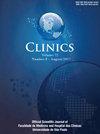巴西当地医疗保健机构的循证护理方案:经验和影响
IF 2.4
4区 医学
Q2 MEDICINE, GENERAL & INTERNAL
引用次数: 0
摘要
目的概述巴西圣保罗一家大型医院的循证护理项目(EBCP)对专业人员决策的影响。方法回顾性描述性分析某医院EBCP数据库(涵盖40个月),包括所进行研究的数据和在线反馈调查。结果EBCP自成立以来共完成科学技术报告95份,其中快速系统评价(RSR) 55份,文献评价(LR) 40份。作者确定了21个综述主题,其中3个最常见的是住院患者(n = 20)、肿瘤学(n = 11)和外科手术(n = 9)。评估的3个最常见的技术是医疗器械(n = 28)、药物(n = 27)和量表/问卷(n = 16)。研究主要是用于更新政策或程序(n = 59),支持科学研究(n = 10),支持临床程序开发(n = 8),提供临床指导(n = 7),或作为一种通信工具(n = 5)。在请求者回应调查的反馈(76/95),97%同意或强烈认为他们审查交付满意,100%表示,他们将来可能会请求审查并将表明EBCP同事。在RSR应答者(51/55)中,94%的人同意或强烈同意EBCP工作为他们的项目或最终决策提供了信息,32%的人报告说,所呈现的结果改变了他们对所评估技术的看法。结论项目采用循证方法,为地方决策提供了及时、中肯的证据。使用EBPC的卫生专业人员对这一过程表示高度满意,并报告了他们在决策方面的积极转变。本文章由计算机程序翻译,如有差异,请以英文原文为准。
An evidence-based care program in a local healthcare setting in Brazil: Experience and impact
Objective
To provide an overview of the activities and impact of an Evidence-Based Care Program (EBCP) on professionals’ decision-making in a large hospital located in São Paulo, Brazil.
Methods
Retrospective descriptive analysis of a hospital EBCP's database (covering a 40-month period), involving data from the studies conducted and an online feedback survey.
Results
Since its inception, the EBCP performed 95 scientific technical reports, including 55 Rapid Systematic Reviews (RSR) and 40 Literature Reviews (LR). The authors identified 21 review topics, with the 3 most common being inpatients (n = 20), oncology (n = 11), and surgical procedure (n = 9). The 3 most common technologies assessed were medical devices (n = 28), drugs (n = 27), and scale/questionnaire (n = 16). Studies were mainly used to update policy or procedure (n = 59), support scientific research (n = 10), support clinical program development (n = 8), provide clinical guidance (n = 7), or as a communication tool (n = 5). Among the requestors who responded to the feedback survey (76/95), 97 % agreed or strongly agreed that they were satisfied with the review delivered, and 100 % indicated that they likely would request a review in the future and would indicate the EBCP to a coworker. Among the RSR responders (51/55), 94 % agreed or strongly agreed that the EBCP work informed their project or final decision, and 32 % reported that the result presented changed their perspective about the technology assessed.
Conclusion
Employing evidence-based methodology, the program provided timely and pertinent evidence for local decision-making. Health professionals who utilized the EBPC expressed high satisfaction with the process and reported a positive shift in their decision-making.
求助全文
通过发布文献求助,成功后即可免费获取论文全文。
去求助
来源期刊

Clinics
医学-医学:内科
CiteScore
4.10
自引率
3.70%
发文量
129
审稿时长
52 days
期刊介绍:
CLINICS is an electronic journal that publishes peer-reviewed articles in continuous flow, of interest to clinicians and researchers in the medical sciences. CLINICS complies with the policies of funding agencies which request or require deposition of the published articles that they fund into publicly available databases. CLINICS supports the position of the International Committee of Medical Journal Editors (ICMJE) on trial registration.
 求助内容:
求助内容: 应助结果提醒方式:
应助结果提醒方式:


